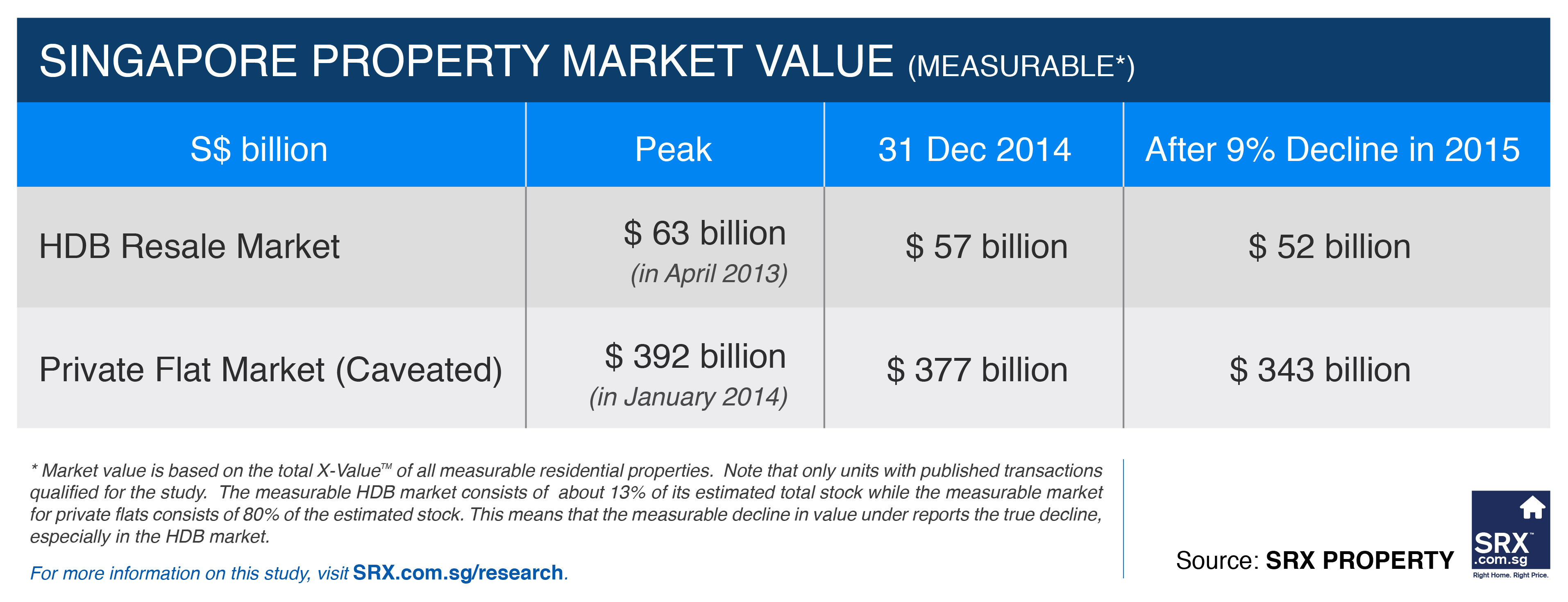
Cooling Measures Contribute to a Measureable Loss of $21 billion and Counting in Property Market Value
In a December 2014 press conference, Minister for National Development Khaw Boon Wan told reporters that a single-digit fall in public housing resale prices in 2015 is manageable and "a very good development."
"A soft single digit is something the human mind, and employers, employees, the environment and the economy can adjust to."
The next question a reporter could have asked, “What is the monetary impact of a single-digit fall in housing resale prices in 2015?”
A common way to answer this question is to calculate the change in measurable market value if prices were to decline by no more than a single-digit, meaning 9%.
According to SRX Property, the Cooling Measures have already resulted in an estimated loss in HDB resale market value of about $6 billion since the peak of the SRX Property Index for HDB Resale in April 2013.
A single-digit drop of 9% in 2015 would result in an additional loss of over $5 billion.
In the private, non-landed market the decline in market value has been more dramatic because it is more possible to measure its market value. (See table’s technical notes for why this is the case; and why the measureable losses in this article understate the property market’s true losses.)
Since the height of the SRX Property Index for Non-Landed Property in January 2014, the measureable value of the private market has declined over $15 billion.
A single-digit drop of 9% in private flat prices in 2015 would result in an additional loss of over $34 billion.
This means that the Cooling Measures have already shrunk the resale market value for HDB and private flats by a measurable $21 billion.
An additional fall of 9% in both markets would result in another $39 billion in losses for a total measureable loss of $ 60 billion since their respective peaks.
Some might argue that the decline in market value is a correction, while others would label it a loss.
It depends on your perspective.
For those who see it as a correction, today’s total measureable loss of $21 billion is not a real number because the market should not have been that high in the first place. People in this camp often tell me that they welcome the decline in prices because then they can upgrade at lower prices, by which they more likely mean to say fairer prices.
The problem with this perspective is that it comes at the expense of people who have seen their homes devalued.
Financial loss comes in several forms. There is the actual loss, but there is also the perceived loss. For example, a person who sells a home during the Cooling Measures could make a profit, but he or she can emotionally (and rationally) conclude that more profit should have been made. This is perceived loss.
Perceived loss comes in other forms and can have significant economic ramifications. For example, when the value of one’s home declines, one feels less wealthy. When one feels less wealthy, the rational response is to cut discretionary spending. When enough households cut discretionary spending, retail suffers and, thus, the economy and jobs suffer.
It is this perceived loss that Mr. Khaw alluded to when he said that a soft single digit decline is something people and economy can adjust to.
In other words, the challenge for leaders is to determine when a prescribed policy has run its course and, if left in place, could result in doing more harm than good to the often fragile psyche of the economy and its people.
Today, a measureable decline of $21 billion in home value represents 5.4% of SingStat’s estimated nominal GDP of about S$ 390 billion in 2014.
9%, being the extreme end of a single-digit drop, would result in $60 billion in measurable losses and represent 15.4 % of Singapore’s estimated 2014 nominal GDP.
Perhaps another question the reporters could have asked at the press conference, “At what point will the human mind be unable to adjust to the decline in the measureable value of Singapore’s property market?”
Sam Baker is co-founder of SRX, an information exchange formed by leading real estate agencies in Singapore to disseminate market pricing information and facilitate property listings and transactions. For more details on the data and calculations used in this article, visit SRX.com.sg/research.

